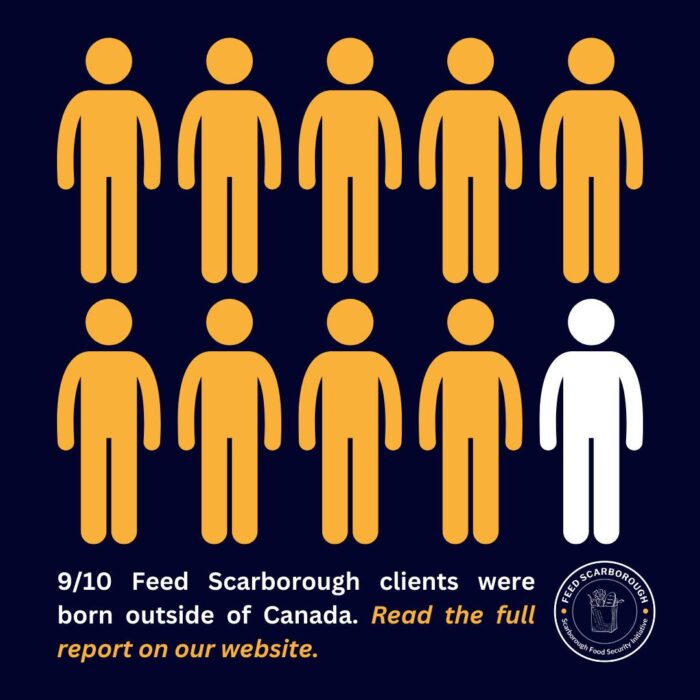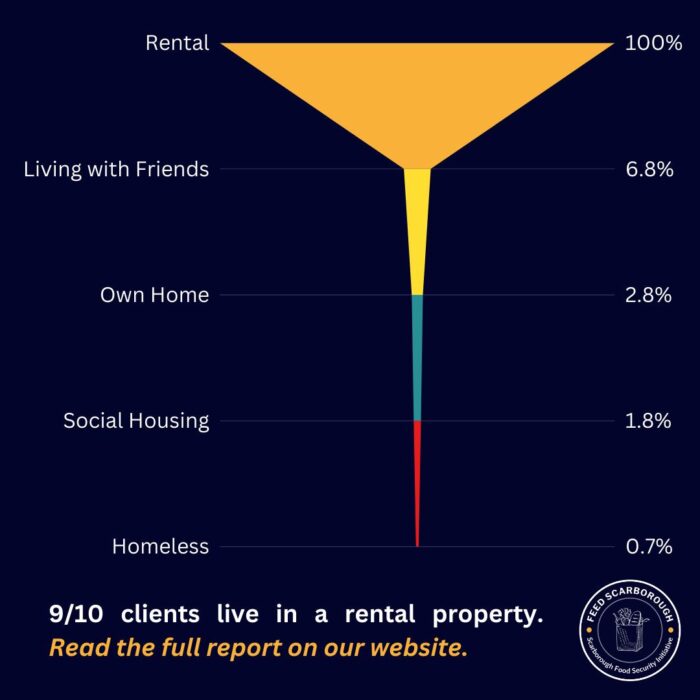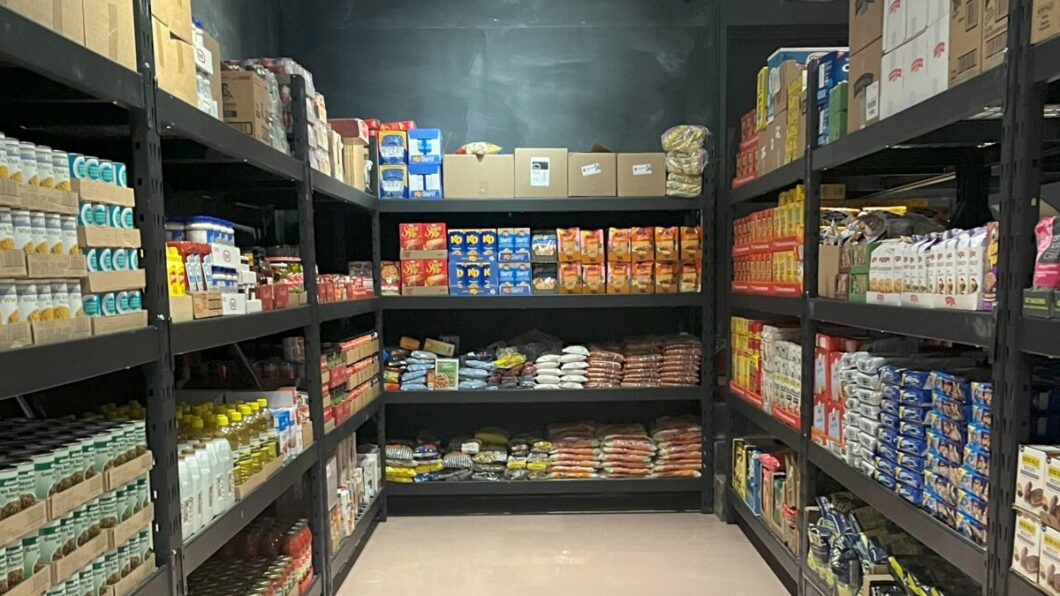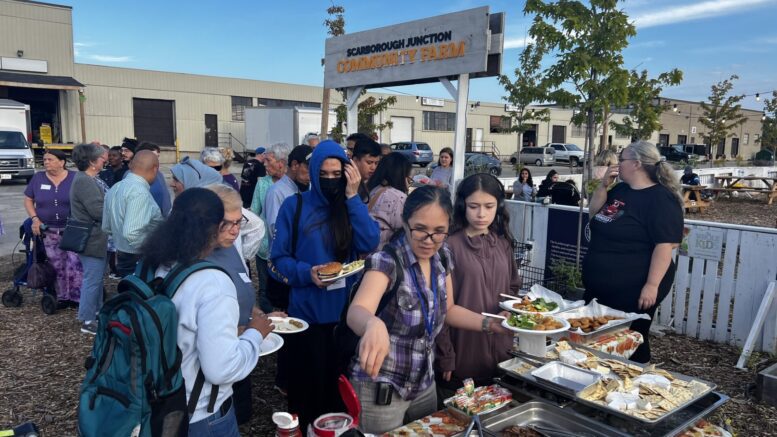With inflation on the rise, people across the Greater Toronto Area are facing food insecurity, especially newcomers.
This is the case for Mohammad Shafin and Adekunie Adebiyi, two international students who have recently settled in Scarborough.
Adekunie Adebiyi is an international student from Nigeria. He arrived in Toronto in September and is attending Centennial College in Scarborough.
With everything being new to him, Adebiyi said he is struggling to understand how things work in Canada, a common experience for many international students upon their arrival to Canada. “Things are not the same way back home,” he said.
While he has applied for many jobs and secured interviews, the moment he mentions he is an international student, they tell him they cannot continue with him.
Many employers are not willing to hire people who might still be struggling to speak English, or who are unable to handle cash, amongst other things.
Adebiyi finds this very frustrating since many of his skills acquired in Nigeria are not taken into consideration when applying for jobs in Canada.
“I have a logistic background back home. I was a field executive where I was working … when I apply for a job, they tell me that I don’t have Canadian experience,” he said.
“If you don’t give me employment, then how do you want me to have Canadian experience?”
Adebiyi is still looking for a job while he studies. He said Canada should help international students be able to secure a job.
Mohammad’s story
Mohammad Shafin is an international student from Bangladesh. Shafin came to Canada to study at Toronto Metropolitan University and has been in Toronto since September 2021.
“Recently, the job field has been shaky,” said Shafin, “I’ve been looking for a part-time job for almost two months now, with no success.”
Both Shafin and his parents are tense over the situation and he fears he might not be able to complete his studies.
Both Adebiyi and Shafin go to Feed Scarborough’s food banks. Because most of the money being sent to them or any money they earn goes to paying rent and school, leaving them with little to no money to pay for groceries.
Who is helping?
In 2016, 57 per cent of the population in Scarborough were immigrants, while 41 per cent were non-immigrants. In Toronto overall 47 per cent were immigrants vs. 49 per cent non-immigrants. When people arrive in Toronto they are most likely to settle in Scarborough.
“Ninety-five per cent of our clients were not born in Canada, and 72 per cent of them have been in Canada for one year or less,” said Robin Sagi, coordinator for marketing and donor relations at Feed Scarborough.
Feed Scarborough was started back in 2018 by Suman Roy, who ran for city council for Scarborough Southwest in the recent 2023 byelection. He started Feed Scarborough in his back yard, and since then has been able to open five food banks across Scarborough where people experiencing food insecurity can get access to food and supplies at no cost to them.
The organization also has a three-day-a-week mobile healthy-meal program food truck and three community gardens, and also leads a vaccine initiative in Scarborough Southwest, according to Feed Scarborough’s website. They also offer weekly educational initiatives.
According to their website, Feed Scarborough serves about 4,500 Scarborough residents weekly. Sagi said that since the pandemic, they’ve had an increase in clients.
She believes that food insecurity in Canada is a lot more different than food insecurity in other portions of the world.
“The price of food, in general, is just very expensive,” Sagi said. “The price of food here is very large. That has to do with the fact that we have a very long winter and we can’t produce a lot of things here.”
Sagi also said the minimum wage has not kept up with the rising cost of living.
“Most people don’t get an annual raise,” she said. “You have to fight for that unless you’re part of a union or something.”

Sagi said she understands the situation that people like Adebiyi and Shagin are going through.
When international students come to Canada, they previously needed to have at least $10,000 worth of savings.
However, the average tuition cost for undergraduate university students is CAD $36,100 per year, and $21,000 per year for international graduate students. The living costs average around $15,000 per year for university students.
“$10,000 in savings isn’t even going to get you your rent for a whole year here,” said Sagi, “the ideas that we have around Canada and coming to Canada, and being prepared for Canada aren’t always the representation of what’s happening in Canada.”
The government of Canada recently announced on Dec. 7 that the minimum cost-of-living requirement for new international student application would increase to CAD $20,635 in 2024.
From the moment they arrive, international students are eager to find jobs, but a lot of them face the problem Adebiyi and Shafin face. Sagi said a lot of their clients also volunteer in order to get Canadian experience in the workforce.
This is why many international students and even newcomers struggle to pay for groceries, and even maintain a healthy lifestyle.
Feed Scarborough is a member of Daily Bread and Second Harvest, which is where they are able to get food every week. According to Sagi, they can offer their clients fresh produce, thanks to Second Harvest.
“We really want to promote healthy eating because when people are food insecure, they’re more likely to eat lower nutrition-valued food, rather than food that is healthy for their body and minds,” Sagi said.
Their partnership with Second Harvest also helps them reduce the amount of waste that comes from food.
How did we get here?

The food insecurity that Feed Scarborough’s clients are experiencing is an escalating issue across the city, a situation the Daily Bread Food Bank called “a crisis” in its 2023 Who’s Hungry? annual report.
“Almost one in five people in Canada are food insecure, with that statistic being closer to one in four for Indigenous populations, newcomers, and visible minorities,” said Michael Widener, professor at the geography and planning department at the St. George campus of University of Toronto.
According to Widener, food insecurity impacts all of the Greater Toronto Area, and there are food banks in almost every part of the city. He says that this has been a persistent issue in the city, but that recently this issue has been “getting worse.”
“Data from Daily Bread is showing rapid growth in the number of households using food banks and the frequency of their usage,” Widener said.
Valerie Tarasuk, also a professor at the St. George campus of the University of Toronto in the nutritional sciences department, remarks on the fact many of the people who are facing food insecurity in Canada do have jobs, it’s just a matter of not always being able to make ends meet.
“These are people who, despite in many cases working full-time, do not have sufficient incomes to meet the needs of themselves and their families,” said Tarasuk.
“Neither the federal nor provincial governments are taking responsibility for ensuring that all Canadians have enough money to meet their basic needs,” said Tarasuk.
With more newcomers and international students arriving in Canada every year, food banks are trying their best to help everyone.
However, the increase in food bank users means there will be people that they will be unable to help. This was the case with a food bank in Brampton that denied international students.
Councillor Michael Thompson, of Scarborough Centre, agrees that everyone deserves help.
“If you saw someone that is going hungry or is hungry you want to help them,” said Councillor Thompson.
He said he understands the situation not only in Scarborough but also in the Greater Toronto Area and thinks people should have access to both food and shelter.
He said he is also aware of the fact that some people take advantage of those who are trying to help. People have brought to his attention that people have opened food banks, but that all the resources were not going to where it’s needed.
He did remark on the fact that this was not the case at Feed Scarborough.

Are there any solutions?
According to Widener, these agencies are trying their best to keep up, but they are ultimately not the real answer.
“Reducing the stress people face in paying high rents will free up money so they can buy other essentials like groceries,” Widener said.
However, according to Canadian Centre for Policy Alternatives, people in Toronto should have a minimum wage of $34 an hour, to pay for both rent and food.
“If we agree that everyone should have the right to a basic standard of living,” said Tarasuk, “then we need to ensure that everyone has sufficient income to meet their basic needs.
From Dec. 1 to 22, Feed Scarborough has a reverse advent calendar campaign, in which each day a different food necessity can be taken to their donation sites.

